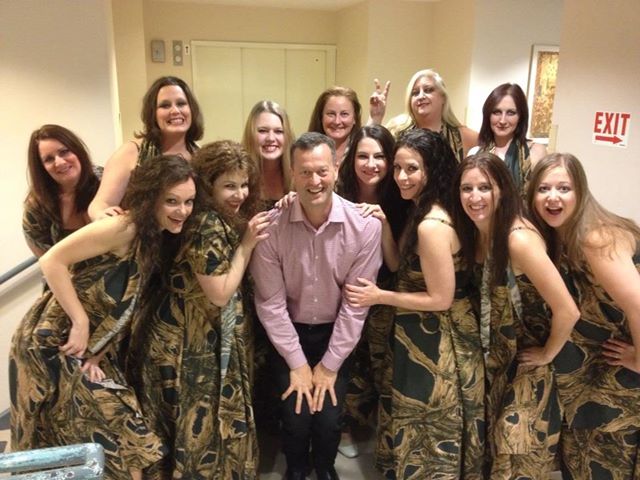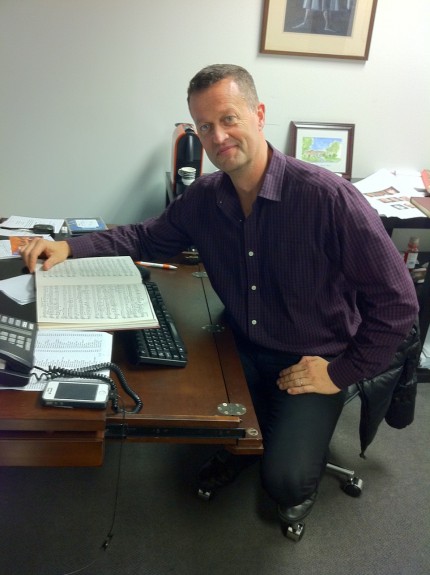For chorus master Michael Black, working with the Lyric Opera singers is a labor of love

“Somebody stop them!” shouted Sir Andrew Davis.
The Lyric Opera of Chicago’s music director had been sitting out in the empty Civic Opera House during a rehearsal of the company’s new production of Wagner’s Parsifal that opens Saturday night. He wasn’t satisfied with the tonal balance among the orchestra, the 42 male chorus members onstage and the 50-some chorus members deployed offstage. Coming down the aisle, he had waved his arms, crisscrossing them like a football referee signaling an incomplete pass. The onstage choristers and orchestra had straggled to a stop, but the offstage chorus continued its celestial song.
“Stop!” the onstage choristers yelled. But the singers packed into two cramped spaces several stories above Lyric’s vast stage couldn’t hear them. Finally they got the message and fell silent, prompting laughs and applause from the onstage chorus.
“You’re up there,” said chorus master Michael Black after the rehearsal. “You’ve got two conductors with headphones and TV monitors. You can’t hear a thing that people are saying onstage.”
What Black cannot help hearing these days on or off Lyric’s stage, however, is high praise for his work. An amiable, gifted Australian, Black, 48, first came to Lyric as interim chorus master for the 2011-12 season. (Donald Nally, chorus master since 2007, left the post in spring 2011.) Martin Wright, chorus director of The Netherlands Opera and Lyric’s choice to succeed Nally, couldn’t take over until August 2012. Wright’s appointment was short-lived, however. He left Lyric in mid-November for what the company described as “health reasons.” One month later Lyric announced that Black would return, this time on a permanent basis.
According to Black and several Lyric choristers, his initial year in Chicago was something of a love fest. Opera Australia’s chorus director since 2001, he took a one-year leave from the Sydney-based company to work at Lyric.
“I liked their work ethic very much,” said Black about his early work in Chicago. “I like the fact that they wanted to get things right. It made a good fit. If they didn’t have that work ethic or that desire to get as close to perfection as you can get, there was no way I would have been vaguely interested.
“I smile a lot,” he said, “but I’m tough. I like to get my own way.”
When Black left in spring 2012, he asked Lyric administrators to keep him in mind if the job opened up again. He had no idea it would happen so quickly. He recalled getting an early-morning phone call from Sir Andrew.
“I was in Melbourne, touring with Opera Australia,” said Black. “And the phone rang at something like 7 in the morning. I didn’t pick up and it kept on ringing so finally I picked up and it was Sir Andrew. He said, ‘Look, I don’t know how serious you were. But the job has become available again and we’d like to offer it to you.’ I didn’t have to think; I said, ‘Yes, absolutely’.”
The answer to Sir Andrew’s next question was equally unequivocal: No.
“He said, ‘Can you start on Saturday?” Black said with a hearty laugh. “So we kept talking and pushing it farther back.”
“We just adored him and hated saying goodbye that first year,” said bass Scott Holmes, a Wilmette resident who has sung with Lyric’s chorus for 42 years. Once Nally announced he was leaving, Lyric brought in six candidates to meet the chorus as part of the audition process. They talked briefly about themselves, answered questions and conducted a short rehearsal.
Holmes cited the “chemistry” between the chorus and Black and his “affability.” He manages to get superior results, Holmes said, without resorting to harsh criticism.
“There’s never a hint of meanness or superiority or talking down to you,” he said.
“Everything is done very positively. I’m not saying Michael’s a pushover. He wants what he wants and he works until he gets it. But it’s always done on a level of colleague to colleague. This is a perfect fit for our chorus at this stage. It’s a joy to go to work every day.”
“It was love at first sight,” said Pamela Williams of Skokie, a mezzo-soprano who is starting her 14th season with the chorus.. “His presence is so easy-going. He’s not rude, he’s not scary. He just wants excellence, and you want to give it to him.
“One of the things that stood out right away is his ability to get us to sing well together as a group. He’s not trying to make big voices sound smaller to blend or smaller voices sound bigger to blend. He wants you to sing the best you can with your voice. There’s a lot of power when we need it, there’s a lot of dynamic diversity.”
Oak Park resident soprano Desiree Hassler values Black’s understanding of individual voices. She has sung with Lyric’s chorus for four years.
“He acknowledges that the chorus is really an ensemble of soloists,” said Hassler. “He wants the most healthy, true-to-your-own-sound kind of singing. Even at the end of a really long week singing opera, I still feel very fresh. That testifies to his ability as a chorus master.”
Black’s path to choral conducting was hardly traditional. He studied piano as a youngster in Sydney, and growing up in a Mormon household, there was plentiful music-making during services. (He has since left the church.) He earned degrees from two leading music schools in Sydney–the Sydney Conservatorium of Music and the University of New South Wales. But neither singing nor conducting were part of his professional game plan.
“I fell into it,’’ said Black, sitting in his small, colorfully appointed office after rehearsal. Slim, soft-spoken with a ready smile and direct gaze, he looked fresh in a blue dress shirt unbuttoned at the collar and dark slacks.
“I had no training conducting or training as a chorus master,” he said. “My first degree was in music education. Then my first post-grad degree was piano performance majoring in accompaniment. Then I still wasn’t sure what I wanted to do, and so I did a master’s in musicology specializing in 19th century [music] analysis. I spent all my time in the library, and I learned to hate it.”
Black eventually landed at Opera Australia as a rehearsal pianist, first as a part-time freelancer. When the full-time post of assistant chorus director opened up after a few years, the company offered it to him.
“What I didn’t know,” he said with a self-deprecating laugh, “was that they had offered it to three other people ahead of me.” Black expected that he would continue to just play the piano.
“I soon realized I would have to take rehearsal, I would have to conduct backstage and manage people. I didn’t realize any of that. I had no experience whatsoever. You pick it up, you look and you learn. I learned on the job.”
When the Opera Australia’s chorus master left 18 months later, Black applied for the post. But incoming music director Simone Young said he was too inexperienced for the job. She told him to travel and hear as many top-flight choruses as possible. With the help of an Opera Foundation Bayreuth Scholarship, he took her advice.
“I went off to Europe,” said Black. “I studied with, observed, followed around every chorus master I could find—Berlin Staatsoper, Cologne, Hamburg, Dresden, Bastille Paris, Covent Garden. I just listened to the sound, watched what they did.”
When he returned to Australia, the Opera Australia chorus master post was open once again. After a trial year, Young appointed him to the job.
Lyric’s season of eight operas is shorter than Opera Australia’s, which presents 16 operas over a 12-month season for a total of 200 to 250 performances in Sydney, Melbourne and other Australian cities. Black will live in Chicago full-time during Lyric’s season but return to Australia between seasons. Which means he arrives at the start of Australia’s winter.
“I’ll never have summer, ever,” he said with a smile.
But working with a chorus on a range of repertoire from Mozart to Jerome Kern and beyond continues to excite him. One challenge for the male chorus in Parsifal, he said, is creating a unified but still colorful sound in music that is largely sung in unison.
“For the men, I want it to sound heavy,’’ said Black. “I tend to go more toward the European sound—sort of dark, round, rich. They need encouragement to do that. Sometimes they get so enthusiastic that [they’re singing] just open and out rather than thinking about the whole.”
“I like molding the sound,” he added. “I love the human voice. I love lots of human voices together. The sound and the tension—it’s just phenomenal. To hear 100 people sing incredibly quietly is, to me, even more exciting than hearing 100 people singing loudly. The colors you can get, the personalities the singers bring, it’s wonderful.”
“One of my favorite sayings in life is: ‘On the way to my dream, I got lost and I found a better one’. I wanted to be the best accompanist in the world, I wanted to be this, that or the other. But I found something that I loved to do. And I still love it.”
Wagner’s Parsifal starring Paul Groves, Thomas Hampson and Daveda Karanas opens at Lyric Opera 6 p.m. Saturday and runs through November 29. lyricopera.org; 312-332-2244.
Posted in Articles






Posted Nov 04, 2013 at 7:40 pm by Tomby
He has been an engaging chorus master in australia and has always asked for and got, the best! Sydney’s loss is Chicago’s gain!
Posted Nov 11, 2013 at 8:53 am by bw
The chorus is now recognized as one of the foundations of the lyric opera of chicago.
The pressence Michael Black augments this and amplifies their musicality and the joy of performing. A gift given and received.